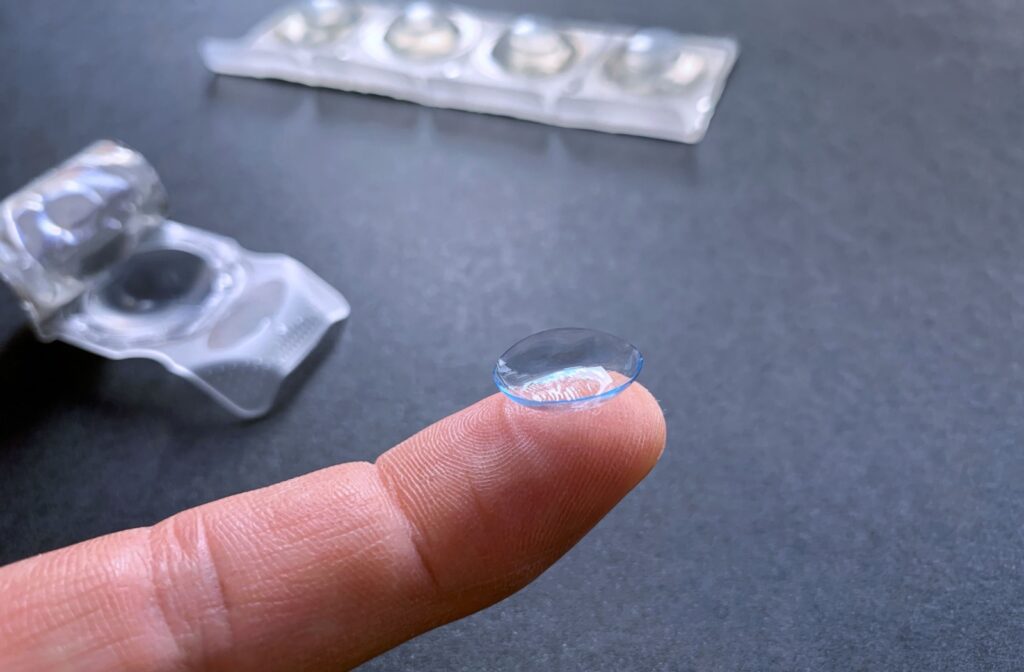Contact lenses are a wonderful alternative to eyeglasses, offering unparalleled comfort and a sharp, natural visual field. However, contact lenses do expire. Their shelf life varies depending on the type of contact lens and whether their blister pack is sealed.
Wearing expired lenses is about more than discomfort alone. With time, the lens material weakens, affecting the quality of visual sharpness. It also puts you at greater risk of eye infections that can lead to serious complications.
The Shelf Life of Contact Lenses
Contact lenses are accessible and simple tools that seamlessly correct vision. What you may not realize is that contact lenses are also medical devices that require an updated prescription and a proper fitting.
The lifespan of contact lenses depends on 2 main factors:
- If the lenses are open or sealed
- The type of contact lenses you’re using
Unopened Contact Lenses
Manufacturers tightly seal soft contact lenses in a buffered saline solution. The package and expiry dates appear on the box and each blister pack, as with any health product. Depending on brand and lens type, the expiry date ranges from 4 to 5 years from the manufacturing date
Beyond this date, the sterility of the saline solution inside the blister pack cannot be guaranteed. Exposure to air, temperature changes, or chemical degradation can compromise the lenses, making them unsafe to use.
Always check the expiration date printed on the box or blister pack before wearing the lenses. If they’re past the date, do not use them—even if the packaging appears intact.
Opened Contact Lenses
This changes once you open contact lenses from their blister pack. Immediately, the environment exposes the lenses, changing their lifespan depending on the lens type.
Take soft contacts, for example, which are by far the most popular among wearers:
- Daily disposable lenses: These are single-use lenses only. Dispose of them, even after 1 hour of wear.
- Bi-weekly lenses: These are safe to wear for up to 14 days with proper cleaning and storage. Discard and replace them after 2 weeks.
- Monthly lenses: With proper cleaning and storage, you can wear these lenses for up to 30 days. Dispose of these lenses after 1 month.
Soft contact lenses, for instance, are much more delicate than their reusable counterparts. Even if you store them properly, they’re at risk of tearing or ripping, even in your eye.
Although bi-weekly and monthly contacts are much more durable, using them beyond their recommended life increases the risk of introducing harmful pathogens into your eye. Over time, even with proper handling, protein deposits can accumulate on the lens, leading to eye irritation and increasing your risk of infection.
Why Do Contact Lenses Expire?
You might wonder why an unopened package of contact lenses can “go bad.” The reasons involve science and safety.
Material Degradation
Soft contact lenses are delicate and thin, and part of what makes them feel so comfortable. With time, their silicone hydrogel can weaken or degrade.
Expired lenses may not provide the same level of comfort or oxygen permeability, increasing the risk of irritation, dryness, and infection.
Contamination Risks
The saline solution that nourishes the contact lenses can lose its sterility once it surpasses the expiration date.
Even the slightest contamination could lead to serious eye infections, including corneal ulcers.
Changes in Chemical Properties
Environmental factors like heat and light can alter the chemical composition of the lenses and the saline, potentially making them unsafe for direct contact with your eyes.

Can You Store Contact Lenses Beyond the Expiration Date?
Even if you store contacts in ideal conditions, you should never use them past their expiration date. Changes in temperature and humidity can degrade the solution they’re kept in, affecting the lens material over time, and making them unsafe.
Contact lenses are a wonderful way to correct your vision, but they require more care and maintenance than glasses for a reason. They interact directly with your eyes, and the risk of poor maintenance simply isn’t worth the potential complications.
What Happens if You Wear Expired Contacts?
Wearing expired contact lenses introduces significant risks to your eye health. Here are just a few potential consequences:
- Eye irritation and discomfort: Expired lenses may not hold their original shape, leading to irritation, redness, and general discomfort.
- Blurry vision: Compromised lens material can distort your vision, making it harder to see clearly.
- Eye infections: An unsterile saline solution can introduce dangerous bacteria into your eyes. Common infections include conjunctivitis (pink eye) and keratitis, which require immediate medical attention.
- Serious eye damage: Continuously wearing expired lenses can lead to corneal ulcers or scarring, which are severe complications that can lead to permanent vision loss in severe cases.
If you’re experiencing a reaction to your lenses, even if they’re still viable, stop using them and visit your optometrist immediately.
Contact Lens Wear & Care
The cardinal rule of contact lenses is being diligent about cleaning, storing, and wearing them properly. This helps preserve the life of your contact lenses and keeps them safe and comfortable, so you can enjoy sharp vision:
Along with following the lens replacement schedule, here’s what you need to know:
- Store your lenses properly: Keep them in a cool, dry place away from direct sunlight.
- Replace the storage case: Bacteria can accumulate in your lens case; clean it daily and replace it every 1–3 months.
- Avoid tap water and saliva: Never rinse lenses with non-sterile liquids. It can introduce harmful pathogens to the lenses. Always place your lenses in fresh contact lens solution.
- Annual contact lens exam and fitting: Yearly exams are a must for every contact lens wearer. More than updating your prescription, your eye doctor evaluates your eye health (to see if you can sustain lens wear) and verifies that the fit is perfect.
Protect Your Vision
Contact lenses may be small and delicate, but you can always replenish your supply. Your eyes, however, are yours and 1 of a kind. Do right by giving them the care and attention they deserve.
While the lifespan of contact lenses varies, 1 thing is certain: contact lens prescriptions expire 1 year after your exam. Connect with our Total Vision Bonita team and book your next contact lens exam today.


